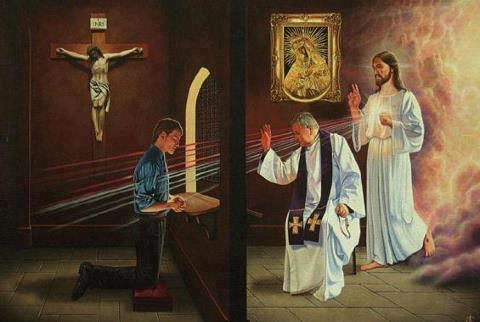We've come to that time of year where there is a little bit of a lull - Halloween is on the horizon, but we aren't experiencing the busy-ness that usually is associated with the holiday seasons (Thanksgiving, Christmas, Easter). And we're not in "vacation mode" that the months of summer often bring (though with the weather the way it's been, maybe you haven't quite shaken the vacation mode just yet!)
The Church even calls this time "Ordinary." So what does that mean for our spiritual life?
It's so easy to get caught up in the day-to-day, ordinary activities of our lives which can leave our spiritual life just sort of there in all of its ordinariness too. For me, personally, this time of year brings on the monotony of work which can be busy some days but then run-of-the-mill on others. And my attitude toward my spiritual life also seems to become more relaxed, which leaves me prone to temptation and sin.
So how can I avoid that? Below are some tips that I find helpful in staving off spiritual monotony to keep my spiritual life afloat.
1. "Know thyself."
The ancient philosophers were not off at all when they suggested the need to "know thyself." We must be consciously aware of ourselves: Our habits, our prayer life, things that make us tick, etc. Knowing ourselves helps us to see more clearly the areas where we may be prone to temptation.
2. Carve out time for Confession.
The Church suggests that we go to Confession at least once a year at a minimum, and in Athens and Pomeroy, we even have community penance services during Advent and Lent so we often make it at least twice a year. But I find that going even more frequently than that is helpful in keeping yourself in check. It kind of goes along with the idea of knowing yourself because you should make a good examination of conscience before each confession!
3. Find your extra thing and do it. Consistently.
It's great that we make it to Mass on the weekend for our weekly obligation. But the Church offers so much more in addition to the weekend Masses! In Athens and Pomeroy, Masses are offered during the week. On Thursdays we have 12 hours of Adoration. We also have prayer groups and other ministries that can help us to steer our lives towards God through fellowship. By striving to make something extra a habit, I bet you'll see a difference in how you react to the world around you.
4. Take time to rest. With God.
We all have a tendency to busy ourselves to the point of exhaustion that we sometimes forget that we need to rest. But the type of rest I'm referring to doesn't mean just sitting in a recliner and doing nothing! By taking time to rest with the Lord - through quiet meditation (in your recliner) or appreciating God's creation on a hike or spending a few minutes in front of the Blessed Sacrament after a long day at work on your way home - you will find moments of peace that will help to recharge your soul to take on another day. I guarantee it!
5. Surround yourself with good people.
It's no secret that I think this is a super important tip as several of my reflections have led back to the importance of having good friends in your life. Being able to surround yourself with people who can keep you in check, pray with you in good times and not so good times, and just be in support of you is incredibly important to bolstering the lifestyle you are striving for!
This is by no means an exhaustive list of tips, but I hope you find it helpful in this time of ordinariness so that you are ready to take on the times of busy-ness that will be upon us in just a few short weeks!
--
Contributed by Mary Catherine Kennedy. Mary Catherine is the Social Media and Web Coordinator for our community. She is also an assistant professor of Communication at Mount St. Mary's University in Emmitsburg, MD.
The Church even calls this time "Ordinary." So what does that mean for our spiritual life?
It's so easy to get caught up in the day-to-day, ordinary activities of our lives which can leave our spiritual life just sort of there in all of its ordinariness too. For me, personally, this time of year brings on the monotony of work which can be busy some days but then run-of-the-mill on others. And my attitude toward my spiritual life also seems to become more relaxed, which leaves me prone to temptation and sin.
So how can I avoid that? Below are some tips that I find helpful in staving off spiritual monotony to keep my spiritual life afloat.
1. "Know thyself."
The ancient philosophers were not off at all when they suggested the need to "know thyself." We must be consciously aware of ourselves: Our habits, our prayer life, things that make us tick, etc. Knowing ourselves helps us to see more clearly the areas where we may be prone to temptation.
 |
| Image courtesy of Vimeo |
2. Carve out time for Confession.
The Church suggests that we go to Confession at least once a year at a minimum, and in Athens and Pomeroy, we even have community penance services during Advent and Lent so we often make it at least twice a year. But I find that going even more frequently than that is helpful in keeping yourself in check. It kind of goes along with the idea of knowing yourself because you should make a good examination of conscience before each confession!
 |
| Image Courtesy of St. Lucy Church |
It's great that we make it to Mass on the weekend for our weekly obligation. But the Church offers so much more in addition to the weekend Masses! In Athens and Pomeroy, Masses are offered during the week. On Thursdays we have 12 hours of Adoration. We also have prayer groups and other ministries that can help us to steer our lives towards God through fellowship. By striving to make something extra a habit, I bet you'll see a difference in how you react to the world around you.
4. Take time to rest. With God.
We all have a tendency to busy ourselves to the point of exhaustion that we sometimes forget that we need to rest. But the type of rest I'm referring to doesn't mean just sitting in a recliner and doing nothing! By taking time to rest with the Lord - through quiet meditation (in your recliner) or appreciating God's creation on a hike or spending a few minutes in front of the Blessed Sacrament after a long day at work on your way home - you will find moments of peace that will help to recharge your soul to take on another day. I guarantee it!
 |
| Image courtesy of Athens Catholic Young Adults |
It's no secret that I think this is a super important tip as several of my reflections have led back to the importance of having good friends in your life. Being able to surround yourself with people who can keep you in check, pray with you in good times and not so good times, and just be in support of you is incredibly important to bolstering the lifestyle you are striving for!
 |
| 2015 Pilgrimage to Rome and Assisi |
--
Contributed by Mary Catherine Kennedy. Mary Catherine is the Social Media and Web Coordinator for our community. She is also an assistant professor of Communication at Mount St. Mary's University in Emmitsburg, MD.


Comments
Post a Comment